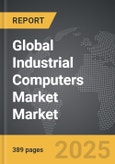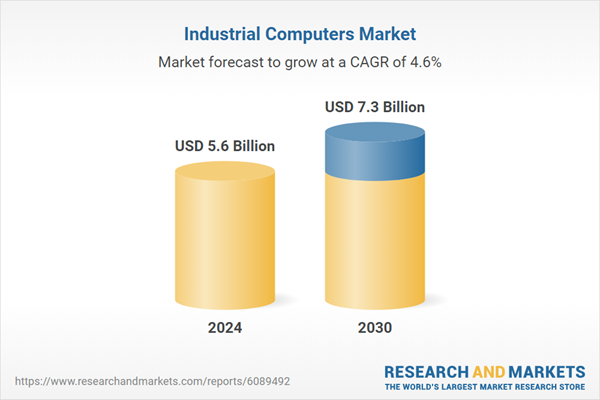Global Industrial Computers Market - Key Trends & Drivers Summarized
Why Are Industrial Computers Critical to Modern Automation and Process Control?
Industrial computers are specialized computing systems designed to operate reliably in harsh environments, including factories, energy plants, transportation hubs, and outdoor infrastructure. Unlike commercial-grade computers, industrial models are built with ruggedized enclosures, extended temperature tolerance, vibration resistance, and long lifecycle support - making them ideal for mission-critical applications in manufacturing, logistics, utilities, and defense. These computers serve as the processing backbone for automation systems, human-machine interfaces (HMI), SCADA control, data acquisition, and machine vision technologies.Their deployment enables seamless communication between sensors, controllers, and enterprise networks, facilitating real-time data processing and decision-making on the edge. Industrial PCs are increasingly being used in distributed control systems (DCS), robotic automation, smart grid management, and predictive maintenance platforms. As industries adopt Industry 4.0 and move toward data-centric operations, the role of industrial computers has shifted from mere control nodes to strategic enablers of digital transformation.
What Technological Advancements Are Shaping the Next Generation of Industrial Computers?
Modern industrial computers are evolving rapidly with the integration of advanced processors, fanless cooling designs, modular I/O architecture, and edge AI capabilities. These systems now feature multi-core CPUs, embedded GPUs, and high-speed SSD storage, allowing them to handle complex computational tasks such as AI inference, real-time video processing, and industrial analytics. Rugged, IP-rated enclosures and passive thermal management systems extend reliability in dusty, wet, or extreme temperature environments, reducing the need for maintenance.Industrial computers are also embracing connectivity standards like 5G, Wi-Fi 6, and TSN (Time-Sensitive Networking) to support high-speed, deterministic communications. Fanless embedded box PCs, panel PCs with touchscreen interfaces, and DIN-rail mounted controllers are widely adopted across industries for space-constrained environments. Software enhancements include support for edge orchestration, virtual machine management, and real-time operating systems (RTOS), which enable flexible deployment in hybrid cloud-edge architectures. These innovations are driving convergence between IT and OT (operational technology) layers in smart industrial settings.
Which Industry Verticals Are Leading the Adoption of Industrial Computers?
The manufacturing sector remains the dominant user of industrial computers, where they facilitate automation, quality inspection, and production monitoring across discrete and process industries. Automotive assembly lines, semiconductor fabs, and packaging plants depend on these systems for high-speed machine control and safety monitoring. In energy and utilities, industrial computers support SCADA systems in power generation, oil and gas fields, and renewable energy installations. Their ability to perform in remote, hazardous conditions makes them ideal for wind turbines, solar farms, substations, and offshore platforms.Transportation and logistics are rapidly emerging markets, using industrial computers for fleet telematics, automated warehouses, ticketing systems, and intelligent traffic control. Smart city projects deploy them in surveillance systems, public kiosks, and infrastructure monitoring. Healthcare and pharmaceutical industries use industrial PCs in laboratory automation, sterile manufacturing, and diagnostic equipment control. Military and aerospace sectors adopt rugged embedded computers for field communications, unmanned systems, and mission-critical data processing. The expanding use cases across verticals reflect the growing dependency on real-time, edge-located intelligence in complex, dynamic operating environments.
The Growth in the Industrial Computers Market Is Driven by Several Factors…
The growth in the industrial computers market is driven by several factors including the accelerating adoption of Industry 4.0 principles, rising demand for edge computing, and the proliferation of automated and data-intensive industrial applications. As organizations prioritize predictive maintenance, real-time analytics, and autonomous decision-making, industrial computers are emerging as the central processing units of smart manufacturing and operational systems. The rise of AI and machine vision in production and quality control workflows is also fueling the need for high-performance, low-latency computing at the machine level.Global trends such as the electrification of transport, expansion of renewable energy infrastructure, and digitalization of legacy industrial systems are creating new growth opportunities. Regulatory mandates around safety, uptime, and data sovereignty are further driving investment in localized, secure industrial computing platforms. Additionally, advancements in modular hardware design, open-standard software frameworks, and remote manageability are enabling faster deployment and lifecycle flexibility. As industries continue to blur the lines between physical operations and digital intelligence, industrial computers will remain vital enablers of resilience, agility, and operational excellence.
Report Scope
The report analyzes the Industrial Computers market, presented in terms of market value (US$). The analysis covers the key segments and geographic regions outlined below:- Segments: Type (Panels, Boxes, Embedded Din Rail, Din Rail, Rack Mount, Other Types); Technology (Resistive, Capacitive); End-Use (Industrial, Transportation & Infrastructure, Electronics, Pharmaceuticals, Other End-Uses).
- Geographic Regions/Countries: World; United States; Canada; Japan; China; Europe (France; Germany; Italy; United Kingdom; Spain; Russia; and Rest of Europe); Asia-Pacific (Australia; India; South Korea; and Rest of Asia-Pacific); Latin America (Argentina; Brazil; Mexico; and Rest of Latin America); Middle East (Iran; Israel; Saudi Arabia; United Arab Emirates; and Rest of Middle East); and Africa.
Key Insights:
- Market Growth: Understand the significant growth trajectory of the Panels segment, which is expected to reach US$1.7 Billion by 2030 with a CAGR of a 3.9%. The Boxes segment is also set to grow at 3.6% CAGR over the analysis period.
- Regional Analysis: Gain insights into the U.S. market, valued at $1.5 Billion in 2024, and China, forecasted to grow at an impressive 7.2% CAGR to reach $1.4 Billion by 2030. Discover growth trends in other key regions, including Japan, Canada, Germany, and the Asia-Pacific.
Why You Should Buy This Report:
- Detailed Market Analysis: Access a thorough analysis of the Global Industrial Computers Market, covering all major geographic regions and market segments.
- Competitive Insights: Get an overview of the competitive landscape, including the market presence of major players across different geographies.
- Future Trends and Drivers: Understand the key trends and drivers shaping the future of the Global Industrial Computers Market.
- Actionable Insights: Benefit from actionable insights that can help you identify new revenue opportunities and make strategic business decisions.
Key Questions Answered:
- How is the Global Industrial Computers Market expected to evolve by 2030?
- What are the main drivers and restraints affecting the market?
- Which market segments will grow the most over the forecast period?
- How will market shares for different regions and segments change by 2030?
- Who are the leading players in the market, and what are their prospects?
Report Features:
- Comprehensive Market Data: Independent analysis of annual sales and market forecasts in US$ Million from 2024 to 2030.
- In-Depth Regional Analysis: Detailed insights into key markets, including the U.S., China, Japan, Canada, Europe, Asia-Pacific, Latin America, Middle East, and Africa.
- Company Profiles: Coverage of players such as ABB Ltd., Abhay Boilers India, Aerofin, Alstom Power, Arvos Group and more.
- Complimentary Updates: Receive free report updates for one year to keep you informed of the latest market developments.
Some of the 44 companies featured in this Industrial Computers market report include:
- Advantech Co., Ltd.
- American Portwell Technology
- Avalue Technology Inc.
- Axiomtek Co., Ltd.
- B&R Industrial Automation GmbH
- Beckhoff Automation GmbH
- CompuLab Ltd.
- DFI Inc.
- Estone Technology
- IEI Integration Corp.
- Irontech Group
- Kontron AG
- Lenovo Group Ltd.
- MITXPC
- Moxa Inc.
- Nexcom International Co., Ltd.
- OnLogic
- Phoenix Contact GmbH & Co. KG
- Siemens AG
- Teguar Corporation
This edition integrates the latest global trade and economic shifts into comprehensive market analysis. Key updates include:
- Tariff and Trade Impact: Insights into global tariff negotiations across 180+ countries, with analysis of supply chain turbulence, sourcing disruptions, and geographic realignment. Special focus on 2025 as a pivotal year for trade tensions, including updated perspectives on the Trump-era tariffs.
- Adjusted Forecasts and Analytics: Revised global and regional market forecasts through 2030, incorporating tariff effects, economic uncertainty, and structural changes in globalization. Includes historical analysis from 2015 to 2023.
- Strategic Market Dynamics: Evaluation of revised market prospects, regional outlooks, and key economic indicators such as population and urbanization trends.
- Innovation & Technology Trends: Latest developments in product and process innovation, emerging technologies, and key industry drivers shaping the competitive landscape.
- Competitive Intelligence: Updated global market share estimates for 2025, competitive positioning of major players (Strong/Active/Niche/Trivial), and refined focus on leading global brands and core players.
- Expert Insight & Commentary: Strategic analysis from economists, trade experts, and domain specialists to contextualize market shifts and identify emerging opportunities.
Table of Contents
Companies Mentioned (Partial List)
A selection of companies mentioned in this report includes, but is not limited to:
- Advantech Co., Ltd.
- American Portwell Technology
- Avalue Technology Inc.
- Axiomtek Co., Ltd.
- B&R Industrial Automation GmbH
- Beckhoff Automation GmbH
- CompuLab Ltd.
- DFI Inc.
- Estone Technology
- IEI Integration Corp.
- Irontech Group
- Kontron AG
- Lenovo Group Ltd.
- MITXPC
- Moxa Inc.
- Nexcom International Co., Ltd.
- OnLogic
- Phoenix Contact GmbH & Co. KG
- Siemens AG
- Teguar Corporation
Table Information
| Report Attribute | Details |
|---|---|
| No. of Pages | 389 |
| Published | February 2026 |
| Forecast Period | 2024 - 2030 |
| Estimated Market Value ( USD | $ 5.6 Billion |
| Forecasted Market Value ( USD | $ 7.3 Billion |
| Compound Annual Growth Rate | 4.6% |
| Regions Covered | Global |









